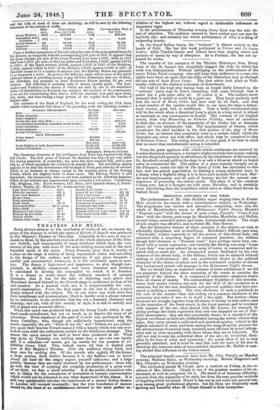THEATRES AND MUSIC.
Being always adverse to the mutilation of works of art, we cannot ap- prove of the manner in which the opera of Roberto il Dictoolo was produced at Her Majesty's Theatre on Thursday. Originally in five acts, it was re- duced. to-three, by the absolute excision of the whole Eharacter of the Prin- cess .Tsabelkt, and consequently of many incidents' which form the very essence of the plot, with some of the most striking scenes and of the most beautiful music in the opera. Every dramatic piece that is worthy of' a place on the stage is worthy of being represented entire and according to the design of the author; and certainly, if any piece demands a careful and conscientious treatment, it is the celebrated opera in ques- tion. The drama is high-toned and impressive: its plot, though com- plicated, is skilfully constructed; and every character and incident is calculated to develop the conception on which it is founded. It is a drama so much above the ordinary stands' d of operatic literature, that it was for the sake of obtaining such pieces that Meyerbeer devoted himself to the French stage in preference to that of his own country. As a musical work, too, it is unquestionably the com- poser's masterpiece. From the first scene to the last it shows a mind deeply imbued sith the subject. We do not know any work more free from remplissage and coininonplace; there is hardly even a phrase uttered by an instrument in the orchestra that has not a dramatic character and meaning; and yet, with all this severit:i of style, it is rich in melody and full of grand and powerful effects. When this opera was produced last year for Jenny Lind's ddbftt, it suf- fered much curtailment, but not so much as to deprive the story of all coherence. What remained of the part of Isabella was performed by Ma- dame Castellau; who, though not sufficiently impassioned, sang the music, especially the airs " laole de ma vie," and "Robert, toi qua j'aime," (we quote their familiar French names,) with a beauty which was not over- looked even amid the enthusiasm excited by the illustrious stranger. This season the opera cannot be said to have been produced at all. What was given on Thursday was nothing more than a set—we can hardly call it a selection—of scenes, got up merely for the purpose of ex- hibiting Jenny Lind. This, indeed, seems all that is wanted just now at Her Majesty's Theatre. Give the audience Jenny Lind, and they care for nothing else. Of the crowds who nightly fill the house, a large portion flock thither because it is the fashion—not to know Jenny (at least on the stage) argues yourself unknown; and a large portion because they are really charmed by her performance: those who go with the view of enjoying the complete production of a great work of art form, we fear, a small minority. It is the public themselves who are to blame for the commission of enormities in operatic representation which would not be tolerated in any other department of the drama- It is still very questionable whether the experiment of a second Italian theatre in London will succeed eventually; but the true foundation of success would be, the want of an establishment devoted to the most perfect ex-
hibition of the highest art, without regard to fashionable influences or temporary rages.
In the performance of Thursday evening Jenny Lind was the sole ob- ject of attention. The audience seemed to have neither eyes nor ears for anybody else: and certainly her whole performance of Alice is a thing of surpassing beauty.


























 Previous page
Previous page